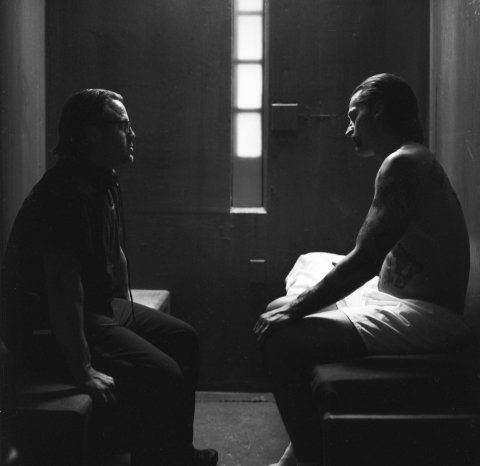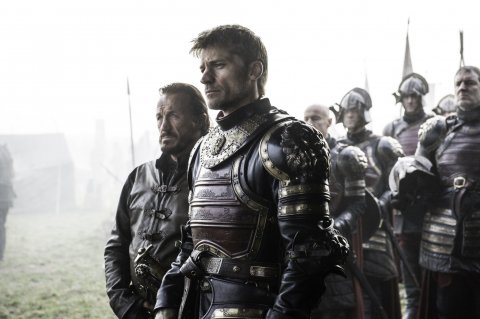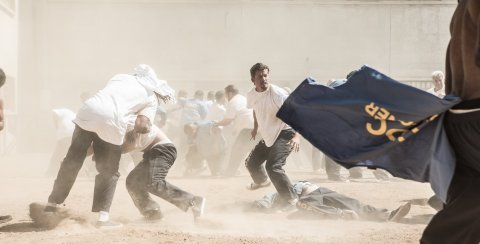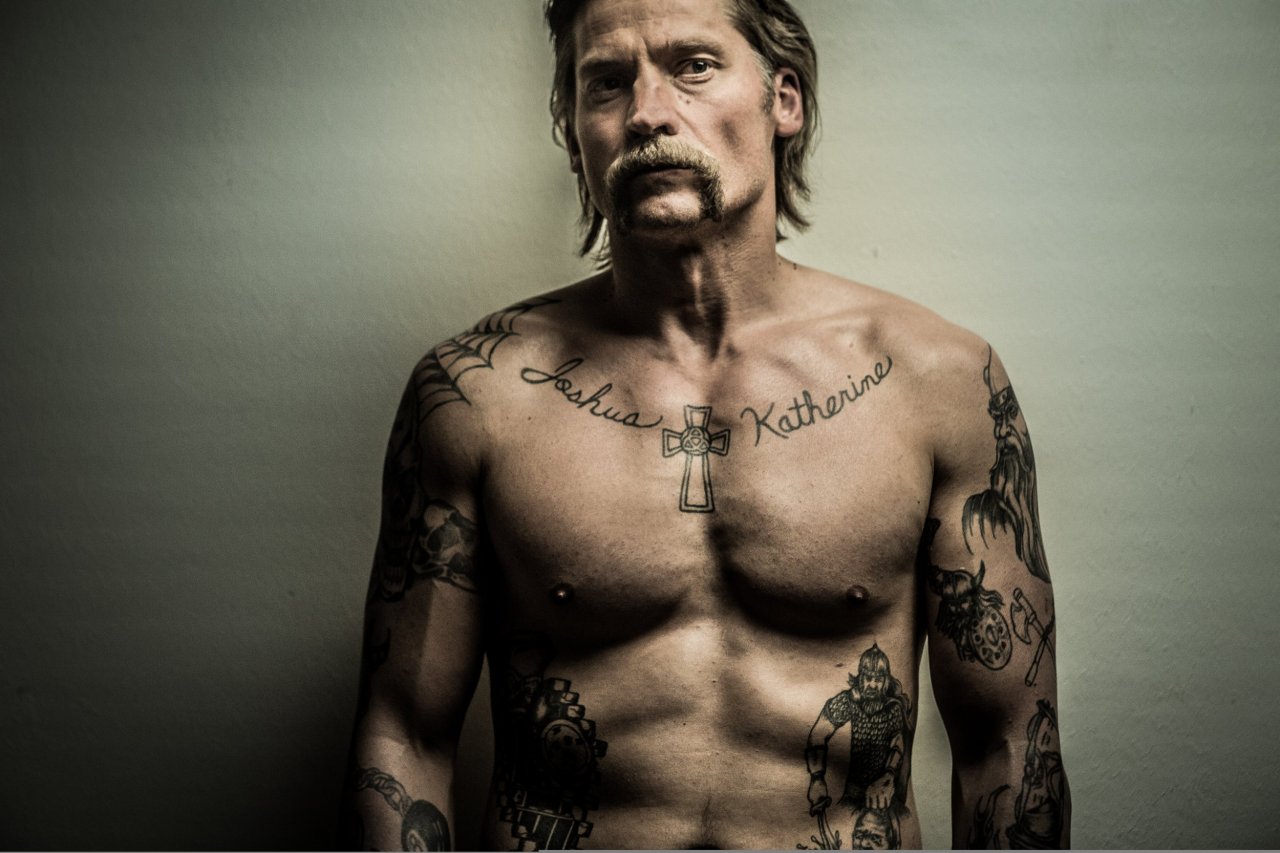Nikolaj Coster-Waldau has the best furtive eye roll in the business. In the first episode of the seventh season of Game of Thrones, playing the roguish knight Ser Jaime Lannister, he observes Cersei, his twin and mother of their three dead children, delivering an unhinged declaration of revenge and world domination. As he stands over his sister-lover, Jaime's expression is priceless: devotion tempered by a sidelong glance of "Yup, she cray-cray."
Lannister is a classic bad guy. And yet if, as some predict, he will be the final hero of Game of Thrones, viewers will buy it, because the Danish actor has, with shadings of warmth and wit, humanized a character that has committed incest, shoved a child from a tower window and produced and protected a son, Joffrey, of epic villainy.
It's a neat trick and one that works well in Coster-Waldau's new film, which is set not in a fantasy landscape but in the American prison system. What the actor found was that these two brutal worlds, rife with murderous power plays, aren't that different, though in the case of Shot Caller, it's real human beings, not fictional characters, who are doing battle. In the film, Coster-Waldau plays Jake, a successful businessman who accidentally kills a friend while DUI. Up until then, he's happily married, with a son, living a privileged life in Los Angeles. When a judge gives him a stiff sentence, Jake is incarcerated for seven years in a system that offers two choices: warrior or victim. He chooses the former, and the film dramatizes how his prison's code of ethics (called "gangster school") eventually replaces his own, transforming him into Money, a soldier in the Aryan brotherhood.

Coster-Waldau visited several prisons with the film's director, Ric Roman Waugh, who went undercover as a volunteer with the California Department of Corrections to research Shot Caller. "Prison is not like The Shawshank Redemption or Orange Is the New Black—which is very good by the way. I watch it with my two sisters," says Coster-Waldau with a laugh. "But you see stuff inside that's not that different from the Middle Ages. That part of society hasn't really evolved—the way we deal with criminals. It really is survival of the fittest."
One revelation particularly surprised the actor. "I'd always believed gangs began outside prison and then continued working for their gangs inside. But what I learned was that all these gangs started inside, and they control what happens on the street from prison. They can do that because, of course, it's not just the inmates who are afraid. It's also the guards."
"Violence breeds violence—that's the dramatic thread of the film," says Waugh. The director's intention to humanize the experience meant he wasn't interested in creating cookie-cutter monsters. "There's a tremendous number of just human beings in prison," says Waugh, "people who have lost their way or made a mistake, and who are doing everything they can to hold on to the moral code they had."
Of course, there are also plenty of people who should never go free again; Waugh introduced Coster-Waldau to one of them. "Nik stared at the devil," says Waugh. "Luckily, that devil was separated from him by steel and glass."He also connected the actor with a former shot caller, one of the men who rule the prison gangs. "A lot of the most notorious told me, 'It's never the guy that's 6-foot-5 and 300 pounds that anybody's scared of," says Waugh. "It's the little guy, because he's got everything to prove to survive. He's the person who will sever someone's head so that no one will mess with him. The one commonality is how absolutely shrewd and smart they are."

In playing a guy who ends up doing things he'd have never before imagined himself capable of, Coster-Waldau "wanted to understand the violence. How do you get to that point?" "Fear" was the shot caller's answer. Says Coster-Waldau, "You're scared all the time. The first time he stabbed someone was because he knew if he didn't do it, the gang would take him down." What most intrigued the actor was the resulting sense of empowerment. "He told me, 'Suddenly, I was in control, and I hadn't been in control of anything for so long. I enjoyed it.' So then he started looking forward to those moments, which is so scary. But it makes sense to me."
In 2015, Waugh made the documentary That Which I Love Destroys Me, about two Iraq vets suffering from post-traumatic stress disorder, and he sees similarities between returning soldiers and ex-cons. "Look, war and prison are apples and oranges; they're very different things and shouldn't be categorized together. But the reintegration for an individual who has done a tremendous amount of time in a violent place—that sense of detachment and estrangement—is very similar. A convict who has been inside for five years or more, his brain has been rewired. People don't realize that's where the recidivism rate comes from."
In America, two-thirds of parolees return to prison, often committing crimes that are worse than what got them incarcerated in the first place. Waugh—who has, with Shot Caller, Snitch and Felon, made three films set in prison—is a critic of mandatory minimized sentencing laws, particularly those for crimes involving drugs, which the current administration is hoping to stiffen again. "I'm not making excuses for criminals," says Waugh, "but when people who have committed nonviolent crimes are coming out as uber-violent gangsters, and when nonviolent offenders are doing more time than people capable of great violence, there's something wrong."

Coster-Waldau describes the Danish prison system as fundamentally the same as America's, "but there are a lot less people incarcerated, per capita, and they don't go away for such long periods of time." His wife, the actress and singer Nukaka, is from Greenland. There, he says, nonviolent criminals "are locked up at night, but in the day they're free to leave the institution. It sounds crazy, but it makes sense. Greenland is tiny, just 55,000 people, and the system is saying is, What you did was wrong, but we also know that you will be part of our society in the future, so you need to stay in contact with it."
Waugh wanted Coster-Waldau to play Jake because of his inherent gravitas as well as his "innate ability to bring a human side to things," but there was a surprise dividend. In several scenes, the character must resort to creative use of his anal cavity. "It's just a part of prison life," says the director. "It's the one place you can stash drugs and weapons, so for guys who've done major time, there's no shame anymore. Nik, it turns out, has a pretty talented butt."
Coster-Waldau laughs when I pass along the compliment. "That's nice—and disturbing."
Shot Caller is available on DirecTV; it opens in theaters August 18.














